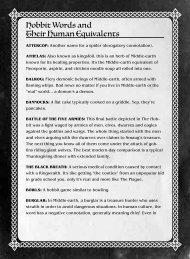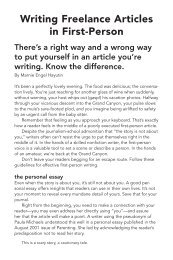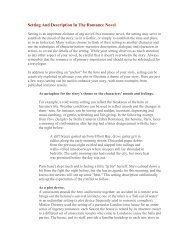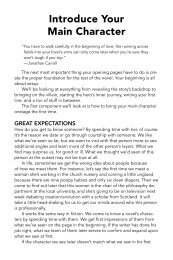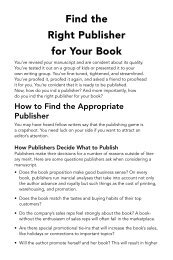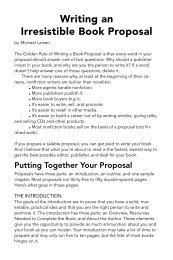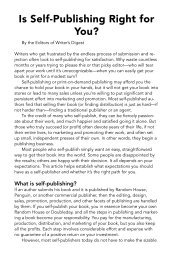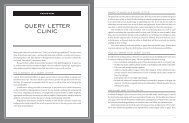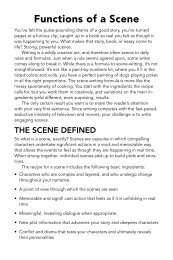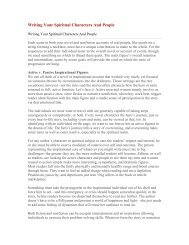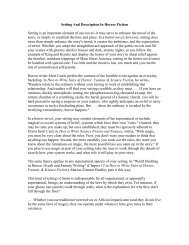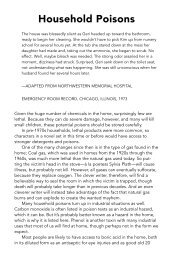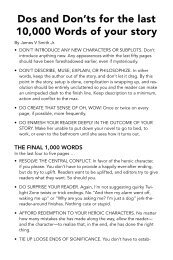Your 30-Second Pitch Download - Writer's Digest
Your 30-Second Pitch Download - Writer's Digest
Your 30-Second Pitch Download - Writer's Digest
Create successful ePaper yourself
Turn your PDF publications into a flip-book with our unique Google optimized e-Paper software.
<strong>Your</strong> <strong>30</strong>-<strong>Second</strong> <strong>Pitch</strong><br />
A tight, well-rehearsed pitch can be<br />
the key to getting an editor or agent’s<br />
attention. Follow these tips and learn<br />
to promote yourself like a pro.<br />
By Dena Harris<br />
Hi, my name is Dena Harris. I’m an award-winning humor writer and<br />
devoted attendant to two imperious cats, whose exploits I describe in my<br />
book Never Feed a Cat Grape Benadryl. I’m seeking a publisher for this<br />
collection of humorous essays and would like <strong>30</strong> seconds of your time to<br />
tell you about it. Is this a good time to talk?<br />
I just pitched you with the latest from my stockpile of personal sound<br />
bites. Just like a <strong>30</strong>-second radio or TV commercial, a good personal<br />
sound bite successfully delivers the message of who you are, what you<br />
want and what you have to offer. Do it well and you’ll leave no doubt why<br />
you’re the best choice for the writing job you’re after.<br />
It’s true that pitching isn’t always easy. Few writers embrace self-promotion<br />
enthusiastically. Just the thought of having to persuade someone<br />
you’re the best person for the job—when you may not even be so sure<br />
yourself—can be intimidating. But with the right approach and plenty of<br />
rehearsal time, delivering your pitch will become second nature, and your<br />
career will be the better for it.<br />
The four components<br />
A good sound bite captures a listener’s attention, sells a product (in this<br />
case, it’s you) and creates a positive, lasting impression—all in an amazingly<br />
brief period of time. Here are the four essential elements in any<br />
successful sound bite:<br />
1. who you are State your name and job title, or the title of the<br />
position you’re seeking. “Hi, my name is Miranda Mechanic, and I’m a<br />
licensed automotive mechanic who writes how-to articles for women
who don’t want their cars to get the best of them.”<br />
2. what you want Don’t beat around the bush. State what you’re after.<br />
“I’m interested in placing some of my articles with your magazine,<br />
Auto Care for Everybody.”<br />
3. why you’re the best choice List any degrees, writing credentials,<br />
training or experience that relate to what you’re seeking. “I’ve been<br />
taking mechanical things apart since before I could walk, and I’m the<br />
owner-operator of my own body shop.”Be sure the qualifications<br />
match your stated goal. Saying you want to write an article on mechanics<br />
and then listing your degrees in early Russian literature won’t<br />
help. If you’re unable to come up with any related experience, name<br />
qualities or skills you possess, such as attention to detail, passion for<br />
the subject and so on.The key is to be brief and memorable. You’re<br />
looking for that special something that separates you from the crowd.<br />
4. a call to action You can do a great job selling yourself, but if you<br />
don’t follow through by asking for what you want, you’ve wasted your<br />
time. Take a deep breath and go for it. “I’d like to show you copies of<br />
my articles, including ‘How to Change a Tire When It’s Twenty Below<br />
Zero’ and ‘How to Add Oil When You’re Wearing a Power Suit.’ ” The<br />
call to action is what leads to further interaction. Don’t neglect this<br />
most important step.<br />
Shrink to fit<br />
The beauty of the personal sound bite is that it can<br />
be used in almost any situation: writing conferences, phone pitches,<br />
query letters, job interviews, networking, on Web sites, in brochures—<br />
anywhere you need to present yourself quickly and succinctly.<br />
Say you’re calling an editor (after you’ve double-checked to make<br />
sure she accepts phone queries) and you reach her voice mail. A prepared<br />
sound bite allows you to sum up your experience and qualifications<br />
in a few sentences and come across as energized, dynamic and<br />
organized. Here’s the first phone pitch I ever made, to the editor of my<br />
local newspaper:<br />
Hi, my name is Dena Harris, and I’m a job-search program coordinator. I’m<br />
interested in writing articles to inform people about effective job-search<br />
techniques. I’ve taught job strategies for three years and had articles published<br />
in ________. Would I be able to show you some of my work and<br />
discuss if your paper would be interested in publishing a series of articles on<br />
this topic?
For your first sound bite, try writing a general introduction (the only<br />
type that doesn’t always require a call to action). I used to panic when<br />
people asked me what I did for a living—I’d rattle off every article I’d<br />
ever published to prove I was a “real” writer. Now I use my sound bite to<br />
explain what I do:<br />
I’m a novelist and freelance writer. I focus on communication, public<br />
speaking and job-search strategies, and I also write humor and personal<br />
essays. I’ve written for pet, parenting and writing magazines, and I write a<br />
monthly job-search strategy column. I also teach public speaking.<br />
Sound bites can be as broad or narrow as you wish. I’ve written them<br />
to describe my books-in-progress, to call magazines to pitch article ideas,<br />
to sell the idea of teaching my public speaking course and to recruit volunteer<br />
facilitators for the job-search strategy program I coordinate.<br />
Rehearse your pitch<br />
Once you’ve written your sound bite, practice it. Stand up and pretend<br />
to shake hands with someone. Be certain you can deliver your lines<br />
without flinching. Whether you memorize your lines is up to you—just remember<br />
to keep your tone conversational. Nothing’s worse than a pitch<br />
that sounds like you’re reading from a cue card.<br />
Also remember that it’s OK to have fun. Editors and agents, like<br />
everyone else, respond to people who are confident and genuine. So if<br />
you’re outgoing and funny, add some appropriate humor. If you’re more<br />
reserved, it’s fine to stick with the facts.<br />
After delivering your sound bite, be prepared to answer follow-up<br />
questions. A <strong>30</strong>-second pitch alone won’t sell your romance novel or<br />
column idea. Be ready to discuss details.<br />
Like any effective commercial, a good sound bite provides everything<br />
your listener needs to know quickly and succinctly. Experiment with writing<br />
different sound bites for various situations. Then use them as a means<br />
of marketing your number one commodity: you.<br />
Dena Harris (www.denaharris.com) is a writer, public speaker and job-search<br />
strategy instructor based in Madison, N.C.



